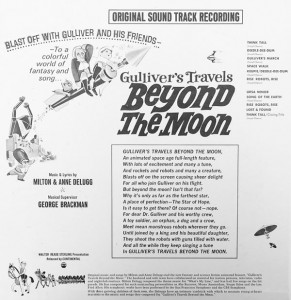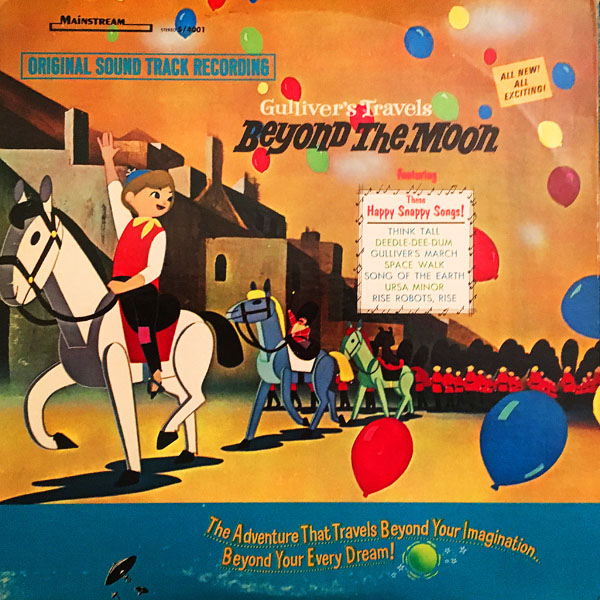Toei Animation’s 1966 feature received deluxe treatment on LP, featuring a score by legendary TV composer Milton DeLugg that evokes movie matinees of the 1960s.

GULLIVER’S TRAVELS BEYOND THE MOON
Original Sound Track Recording
Mainstream Records S-4001 (Stereo) (12” 33 1/3 RPM) (Also released in Mono)
Released in 1965. A&R Producer: Bob Shad. Music Supervisor: George Brackman. Mastering: Gene Thompson. Cover Design: Jack Lonshein. Liner Notes: Ann Lipman. Production Coordinator: Mavis Barton. Album Coordinator: Elena Picone. Running Time: 26 minutes.
Singing Voices: Stephen DeLugg (Ricky); Bob Harter (Robots, Sylvester); Bob Haymes (Colonel).
Happy Snappy Songs: “Think Tall (Main Title),” “Deedle-Dee-Dum,” “Gulliver’s March,” “Rise Robots, Rise,” “Song of the Earth,” “Think Tall (End Title)” by Milton DeLugg, Anne DeLugg.
Instrumentals: “Space Walk,” “Keupie/Deedle-Dee-Dum,” “Ursa Minor,” “Rise Robots, Rise,” “Lost and Found” by Milton DeLugg.
 According to The Animated Movie Guide by our own Jerry Beck, Gulliver’s Travels Beyond the Moon (Garibā no Uchū Ryokō) was an attempt by the Toei animation company to crack the international animation market with a film that followed the basic Disney model in place of traditional Asian tales—with a hefty helping of outer space sci-fi adventure so popular with kids in the mid-century.
According to The Animated Movie Guide by our own Jerry Beck, Gulliver’s Travels Beyond the Moon (Garibā no Uchū Ryokō) was an attempt by the Toei animation company to crack the international animation market with a film that followed the basic Disney model in place of traditional Asian tales—with a hefty helping of outer space sci-fi adventure so popular with kids in the mid-century.
For the English language version, the dialogue and music was provided by many of the same New York talents who provided this service for most of the live-action West German children’s features produced for U.S. matinees by Childhood Productions and narrated by TV personality Paul Tripp. Almost all featured songs by Milton and Anne DeLugg with soundtrack albums issued by either Golden or RCA Camden Records. In the case of Gulliver, Mainstream Records (primarily a jazz label) released the soundtrack LP in a deluxe gatefold package, suggesting a higher-tier project.
Though the film is troubled by several flaws, including overlength, a meandering storyline and awkward comedic attempts, there are also some very impressive graphics, particularly in the Star of Hope sequences. Historically significant is the involvement of a young inbetweener on the film named Hayao Miyazaki, who attracted attention at Toei for his work on the latter portion.
 Gulliver succeeds more as an album than as a film–especially in stereo–one reason being DeLugg’s mastery of recorded and live music. Perhaps the best song is the very catchy “Think Tall.” Sung by a children’s chorus, it suggests one of Milton DeLugg’s more infamous other credits, “Hooray for Santy Claus” from Santa Claus Conquers the Martians (another cubic zirconia gem of ’60s and ’70s kiddie matinees).
Gulliver succeeds more as an album than as a film–especially in stereo–one reason being DeLugg’s mastery of recorded and live music. Perhaps the best song is the very catchy “Think Tall.” Sung by a children’s chorus, it suggests one of Milton DeLugg’s more infamous other credits, “Hooray for Santy Claus” from Santa Claus Conquers the Martians (another cubic zirconia gem of ’60s and ’70s kiddie matinees).
Mr. and Mrs. DeLugg’s other songs are interesting, though not quite as catchy as “Think Tall” (most of the songs came off as somewhat extraneous in the finished film) but the musical score and orchestrations are delightfully infused with solid gold groovy goodness. There’s a lot of Herb Alpert-style brass, rubber-band-bouncy bass and tambourines that would make Davy Jones and Betty Cooper proud.
Milton DeLugg (1918–2015) was an especially familiar name to TV viewers. During the time of this film’s release, he preceded Doc Severinsen as Johnny Carson’s Tonight Show bandleader, before the host moved the show from New York to Los Angeles. DeLugg also composed several Hit Parade tunes, including Perry Como’s “Hoop-Dee-Doo” and Nat King Cole’s “Orange Colored Sky,” as well as an instrumental called “Roller Coaster” that became the theme to What’s My Line.
 He became famous all over again in the ’70s as the bandleader for TV’s notorious Gong Show (“Milton DeLugg and his band with a thug”) as well as the musical director for Macy’s Thanksgiving Day Parade—a position he held until he was 96 years old.
He became famous all over again in the ’70s as the bandleader for TV’s notorious Gong Show (“Milton DeLugg and his band with a thug”) as well as the musical director for Macy’s Thanksgiving Day Parade—a position he held until he was 96 years old.
DeLugg’s signature brass style, a staple of The Gong Show, is heard throughout Gulliver’s Travels Beyond the Moon. Bob Harter, who is heard on the album as an evil robot, Sylvester the crow and the person who sings, “Believe you me” in “Think Tall,” was an East Coast equivalent to the West Coast’s Thurl Ravenscroft, doing bass vocals for countless records, films and TV shows, including appearing both on camera and off for the Rankin/Bass feature, The Daydreamer. (Not heard on the LP are two of the voice cast members, Darla Hood—yes, the same Darla from the Our Gang comedies, who plays the Princess; and Herb Duncan, who voices the dog, Pudge. Duncan was also the voice of Muggy-Doo from The Milton the Monster Show and George on Golden Records’ musical version of The Jetsons.)
The son of the composer and lyricist, Stephen DeLugg, sings and speaks for the young hero, Ricky. Voicing the toy soldier is Bob Haymes, brother of the popular crooner Dick Haymes. The film itself fell into public domain and can be found in dollar DVD bins. Despite its shortcomings, it would be great to see a good print of this film, if only to better enjoy the art direction and a clearer soundtrack.

“Think Tall” – Main Title and End Title
Also released as a single, the main title is every bit the “happy snappy song” promised on the album’s back cover. The end title version, which is not presented completely in the film, is equally peppy, with a generous amount of reverb and hand clapping that conjures up visions of drive-ins and Saturday matinee refreshment ads.
Main Title
End Title


 GREG EHRBAR is a freelance writer/producer for television, advertising, books, theme parks and stage. Greg has worked on content for such studios as Disney, Warner and Universal, with some of Hollywood’s biggest stars. His numerous books include Mouse Tracks: The Story of Walt Disney Records (with Tim Hollis). Visit
GREG EHRBAR is a freelance writer/producer for television, advertising, books, theme parks and stage. Greg has worked on content for such studios as Disney, Warner and Universal, with some of Hollywood’s biggest stars. His numerous books include Mouse Tracks: The Story of Walt Disney Records (with Tim Hollis). Visit 






















































Gulliver’s Travels Beyond the Moon was also known as Space Gulliver and according to Wikipedia it was modeled after the Disney formula of animated musical feature, and sadly it “bombed” in the box office but received a cult following afterwards.What’s unique about this that in the English version it starred Darla Hood (of the Little Rascals/Our Gang shorts) as the Princess of the Moon and in the Japanese version Kyū Sakamoto (who was famous here in the states for the hit song Sukiyaki).
This is an interesting bit of history and, yes, I echo your comment, Greg, that it sure would be nice if we got a restoration of this film just to allow ourselves to hear not only how the music connects to the film but how the original Japanese language version sounds…and, hey, package the film with a newly remastered version of teh soundtrack both in stereo and mono! Yeah, I know, I know, this world will never put that much effort into a film like this, but hey, I can a t least put the wish out there. Thanks for sharing.
Going beyond the voices and replacing the musical score seems extravagant; they did the same thing with “Alakazam the Great” and brought in Lex Baxter.
How common was this with foreign animation, or movie/TV imports in general? Were the original scores considered too exotic for American audiences? Did they simply not have the original music on a separate track? Were there rights / costs encumbering the original music?
You are probably correct in your theory that, back then, a U.S. soundtrack was more marketable to American audiences, especially in a film that they wanted to sell as a soundtrack album in English. Wikipedia says: “Not yet the internationally popular electronic music composer he was later to become, Isao Tomita contributed the original Japanese score.”
I remember Tomita had a popular instrumental album in the ’70s called “Snowflakes are Dancing.” It could be assumed that his sound was not as familiar to U.S. listeners as more conventional songs and music of the day.
When “Prince Planet” came to America in 1966, there was a blend of Japanese orchestral background and American music cues with a beach party kind of sound, because the American theme was composed by Guy Hemric and Jerry Styner, who wrote for American-International beach movies. Speed Racer also used most of the Japanese music, but made changes to the theme song with music by Danny Davis and His Nashville Brass. So it kind of depends on the project.
I remember that Panda and the Magic Serpent still had its original soundtrack including one song where the leader of the White Pig Mob was singing Rock and Roll in Japanese and in Smurfs and the Magic Flute during the banquet scene where Peewit tried to intervene with a group of troubadours the original song (Le Ballade de la Gentle Dame/The Ballad of the Gentle Lady) was done in a Renaissance style but in the English version was a totally different song. Which show that not only Japanese animation was effected but other foreign language films were effected too
The only real good example of one going multilingual was Let It Go from Frozen which was recorded in over 50+ languages including Arabic,Hebrew,Vietnamese,Japanese and even a single was released with a accompanying video showing the many different actresses as the voice of Elsa singing in thier native languages including some doing double duty such as the French/French Canadian,Castilian/Latin American Spanish,Portuguese/Brazilian Portuguese versions.
GREG EHRBAR WROTE:
I’m sure that was the case, Tomita also had his rendition of Gustav Holst’s “The Planets” as well that I’m sure did modestly well over here. Tomita in the 60’s was still very unknown, let alone scoring several animated efforts for Mushi Productions like Jungle Tatei (Kimba The White Lion).
BIGG3469 WROTE:
Given the way that film was released, it doesn’t surprise me if the music track they received had the Japanese vocals on it by default and they couldn’t do a thing about it, let alone hire someone to re-score for that part if the budget permitted. Instead, they had Marvin Miller go and often provide some sort of translation/commentary to the songs heard in places.
Certainly. I’m sure it depends on who’s doing it and what approches they took in doing so. I’m sure the logic of the English dub of the Smurf film was to have it all in English and not be distracted if another language popped up. The new song used wasn’t too bad, but it’s use of synthetic music certainly post-dates Michel Legrand’s original soundtrack throughout.
Given who made the film, it wouldn’t surprise me if they had the budget and resources handy to produce that many versions globally. Hollywood studios usually have more assets and connections to use than foreign ones. Disney in particular would re-film who shots and title sequences to be in different languages for international releases for instance.
Mainstream Records was small, but it was also known for releasing the early records of Ted Nugent (the Amboy Dukes) and Janis Joplin.
Mainstream was also the label that Ted Nugent’s “Amboy Dukes” recorded under a few years later, so it wasn’t all jazz!
Namely it was for the conclusion of what the people of the moon really were, though I don’t think he was responsible for the “It was all a dream” approach to the ending, since he apparently didn’t want to work on Little Nemo for the same reason years later.
The film itself fell into public domain and can be found in dollar DVD bins. Despite its shortcomings, it would be great to see a good print of this film, if only to better enjoy the art direction and a clearer soundtrack.
Toei did release the film on DVD back in Japan. It might be worth a pickup, despite being in all Japanese, but also as an interesting comparison since the music in that was originally by a young Isao Tomita.
http://www.cdjapan.co.jp/product/DUTD-2146